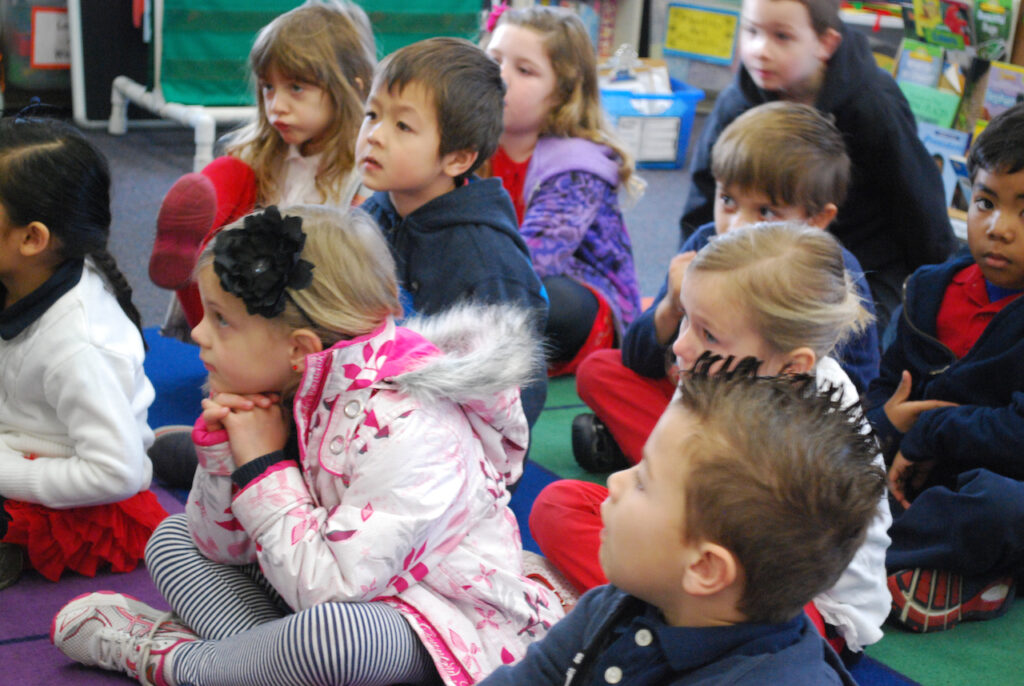Study: Transitional kindergarten students are better prepared for school
 Credit: Lillian Mongeau/EdSource Today
Credit: Lillian Mongeau/EdSource Today
 Credit: Lillian Mongeau/EdSource Today
Credit: Lillian Mongeau/EdSource Today
Children who attended transitional kindergarten performed better on linguistic communication, literacy and math skills when they started kindergarten, compared to their peers who weren't in the program, co-ordinate to a new report.
The American Institutes for Research on Tuesday released its first report that examines the impact of California's transitional kindergarten programme, which was created through the California Kindergarten Readiness Act in 2010.
Transitional kindergarten is a unique, state-funded programme that allows children to get an actress year of schooling earlier kindergarten if their 5thursday birthdays fall between Sept. ii and December. 2. Lawmakers added the new form after they changed the cutoff birthdate for kindergarten, which required children to turn 5 past Sept. 1 in gild to enroll. Almost 83,000 children attended transitional kindergarten, also known as TK, in 2014-xv.
"This study finds that transitional kindergarten does appear to provide students with an reward in terms of their kindergarten readiness," said Heather Quick, one of the report'due south authors and the chief investigator.
When they started kindergarten, children who attended transitional kindergarten were academically as much as five months ahead of their peers, who were a like age, the report shows. Researchers found that transitional kindergarten students had college literacy skills, such as identifying letters and sounds, and more advanced math skills, such as counting objects and completing discussion problems, than those who did not get to transitional kindergarten.
The study also found that transitional kindergarten students had "greater executive office" – skills, such as remembering the rules and controlling impulses. Yet, the report found no major differences between the two groups in social and emotional skills.
The study examined assessments and teacher surveys from two groups of kindergartners:
- i,562 children who attended transitional kindergarten and whose birthdays were between Oct. 1 and December. 2.
- one,302 children who were ineligible for transitional kindergarten considering their birthdays were between Dec. 3 and February. two.
- All children in the report attended kindergarten in 2013-fourteen at 164 simple schools in 20 districts.
Quick said researchers wanted to compare children who were close in age. More than than fourscore percent of the comparison children attended some type of center-based preschool, such equally private campuses or Caput Start.
"Nosotros're non trying to pit TK against preschool," Quick said. "What we can say is that TK appears to take an impact on educatee learning compared with the concern-as-usual scenario. That is, what kids would have received had they not gone to TK."

American Institutes for Research
A Dec 2022 report shows that children in transitional kindergarten performed stronger academically than a comparing group past the time they got to kindergarten. Click on the graphic for a larger image.
The report highlighted a few major differences betwixt transitional kindergarten and preschool.
Transitional kindergarten teachers must hold available's degrees and pedagogy credentials, while preschool teachers oft don't have degrees. The California Land Preschool Program, for example, requires only a allow that is obtained after completing 40 college units.
"Many of the TK teachers taught kindergarten and so they are very familiar with the curriculum," Quick said.
Also, transitional kindergarten is part of the K-12 school system, which means that classes are run largely past public schoolhouse districts on elementary campuses.
"There is probable to be more alignment between TK and the school's K-3 experience than between other early education programs and the M-iii experience," the report states. "This close alignment may assistance TK be more successful in increasing students' kindergarten readiness."
The report says that schoolhouse district leaders may look at the results of the study when deciding whether to aggrandize transitional kindergarten for younger 4-year-olds. A state law change earlier this year allows school districts to employ their own money to pay for transitional kindergarten for more 4-year-olds – those who plough 5 after Dec. 2.
Leaders from Early on Edge, a group that advocates for early education, praised the report for showing how transitional kindergarten can work.
"Children in transitional kindergarten are getting a significant boost in kindergarten readiness," Deborah Kong, president of Early Edge California, said in a argument. "AIR's research confirms that California made a smart investment in TK. Now with new clarity in law well-nigh funding for expanded TK, districts are encouraged to offer an additional option to immature learners and their families to build a potent foundation for success in school."
Erin Gabel, the deputy director of First 5 California, said the report "validates the investment California has made in that cohort of children." She said she hopes information technology will encourage legislators and others "to think more broadly most early learning equally a strategy to shut the achievement gap."
EdSource reporter Susan Frey contributed to this report.
To get more than reports similar this one, click here to sign upwards for EdSource's no-toll daily email on latest developments in education.
Source: https://edsource.org/2015/study-transitional-kindergarten-students-are-better-prepared-for-school/91437
0 Response to "Study: Transitional kindergarten students are better prepared for school"
Post a Comment